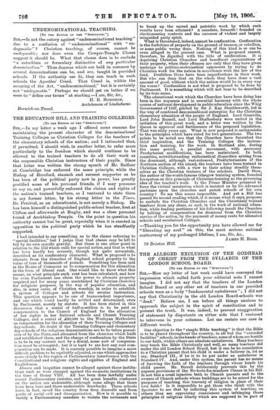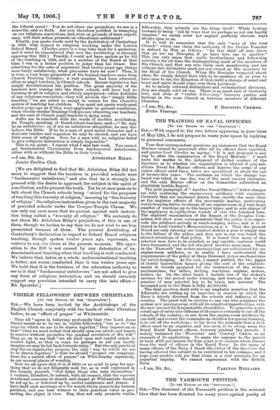THE ALLEGED EXCLUSION OF THE GODHEAD OF CHRIST FROM THE
SYLLABUS OF THE LONDON SCHOOL BOARD.
[TO THE EDITOR Or THE " SPECTATOR." J
Sra,—How my letter of last week could have conveyed the impression which called forth your editorial note I cannot imagine. I did not say that the teachers of the London School Board or any other set of teachers in our provided schools were as a body "fundamental unbelievers " ; I did not say that Christianity in the old London Board-schools was " dead." Believe me, I am before all things anxious to approach the subject in the spirit of conciliation and to present the truth. It was, indeed, to prevent exaggeration of statement by disputants on either side that I ventured to intervene in your columns. Let me restate our case in
different words.
Our objection to the " simple Bible teaching" is that the Bible is to be placed throughout the country, in all but the "extended facilities" schools, in the hands of teachers, some of whom are hostile to our faith, whilst others are absolute unbelievers. Many teachers may teach the Bible Christianly and well, as many teachers did under the old London School Board, but it can be no consolation to a Christian parent that his child. is under a believer in, let us say, Standard III., if he is to be put under an unbeliever in Standard IV. And, under this system, the parent has no means of knowing the faith of the teachers through whose hands his child passes. Mr. Birrell deliberately prevents this by the express provisions of the No-tests-for-teachers Clause in his Bill. Is not this a cruel injustice both to Church parents and to the owners of Church schools whose buildings are to be seized for the purposes of teaching this travesty of religion in place of their own faith P Is it impossible to get those who think with the Spectator to see that by inflicting this system of teaching on others they are oppressing consciences and infringing those principles of religious liberty which are supposed to be part of
the Liberal creed ? You do not share our prejudices, we are in a minority, and so forth. Are you therefore justified in trampling on our religious convictions, and, even on grounds of mere expedi- ency, will such action promote an educational settlement?
Finally, you quote words used by the Archbishop of Canterbury in 1894 with respect to religious teaching under the London School Board. (Twelve years is a long time back for a quotation, and it must be remembered that now the Archbishop is strongly opposing this Bill.) Frankly, I could not have spoken as he did of the teaching in 1894, and as a member of the Board at that time I was in a better position to judge than his Grace. But admitting for the sake of argument that twelve years ago things were fairly satisfactory, what guarantee have we now ? Then, it is true, a very large proportion of the trained teachers came from Church Training Colleges ; a vast number had been educated, often as pupil teachers, in Church schools. Recent legislation has simply revolutionised the position. The great majority of the teachers now coming into the State schools will have had no training at all in religion, and utterly unprepared—often destitute of any religious conviction—they will provide the " simple Bible teaching " we are asked to accept in return for the Church's system of teaching her children. You must not quote words used twelve years ago as if they were applicable to present conditions, when wholly secular Training Colleges are educating our teachers, and the race of Church pupil teachers is dying away.
Suffer me to conclude with the words of another Archbishop. Dr. Temple, speaking of Board-school teachers, said :—" He may be an unbeliever; or, if not an unbeliever altogether, he may dis- believe the Bible. If he be a man of good moral character and a first-rate teacher and organiser he may be elected, and yet have little sense of religion. Now, for a man with no religious belief to give religious instruction is simply impossible."
This is my point. I repeat what I said last week. You cannot get fundamental Christianity from fundamental unbelievers, either with or without the Bible in their hands.
Junior Carlton Club.
[We are delighted to find that Mr. Athelstan Riley did not mean to suggest that the teachers in provided schools were "fundamental unbelievers," and also that he is strongly im-
pressed with the desire to approach the subject in the spirit of conciliation, and to present the truth. Yet he at once goes on to talk about the Church schools being " seized for the purposes of teaching this travesty of religion," meaning by "this travesty of religion" the religious instruction given in the vast majority of provided schools under the Cowper-Temple Clause. We can only say once more that we protest against such instruc- tion being called a "travesty of religion." We certainly do not share Mr. Athelstan Riley's prejudices, if this is one of them, though we hasten to say that we do not wish to see him
persecuted because of them. The present Archbishop of Canterbury's declaration in regard to School Board religious teaching, though spoken twelve years ago, represents, we venture to say, his views at the present moment. His oppo- sition to the Bill is not caused by any detestation of =- denominational teaching when that teaching is well conducted. We believe that, taken as a whole, =denominational teaching is better, not worse, conducted than it was twelve years ago. We hold that it is the business of the education authority to see to it that "fundamental unbelievers " are not asked to give any form of religious instruction, and we should certainly support any provision intended to carry this into effect.— En. Spectator.]











































 Previous page
Previous page